- Clone
- 23C6 (See other available formats)
- Regulatory Status
- RUO
- Workshop
- V S246
- Other Names
- Vitronectin receptor, Integrin αV/β3, ITGAV, ITGB3
- Isotype
- Mouse IgG1, κ
- Ave. Rating
- Submit a Review
- Product Citations
- 3 publications
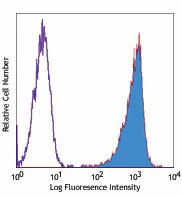
| Cat # | Size | Price | Quantity Check Availability | Save | ||
|---|---|---|---|---|---|---|
| 304412 | 100 µg | £137 | ||||
CD51/CD61 is an integrin complex known as αVβ3. It is expressed at high levels on osteoclasts, endothelial cells, and melanoma cells and at low levels on platelets and macrophages. CD51 is a heterodimer composed of disulfide-linked 125 kD and 24 kD proteins. CD61 is also a member of the integrin family known as gpIIIa or β3 integrin. It is a 110 kD common β subunit of CD51/CD61 or CD41/CD61 complex. CD51/CD61, also known as the vitronectin receptor, mediates the binding of platelets to immobilized vitronectin without prior activation. Other ligands include RGD-containing proteins such as fibrinogen, fibronectin, von Willebrand factor (vWf), laminin, thrombospondin and the neural adhesion molecule L1. CD51/CD61 also mediates cell-cell adhesion via interaction with CD31. CD51/CD61 acts as an activation-independent receptor for platelet attachment and spreading on vitronectin and other RGD-containing proteins, including matrix components. The 23C6 antibody has been reported to be useful for blocking studies.
Product DetailsProduct Details
- Verified Reactivity
- Human
- Reported Reactivity
- African Green, Chicken, Cynomolgus, Rabbit
- Antibody Type
- Monoclonal
- Host Species
- Mouse
- Formulation
- Phosphate-buffered solution, pH 7.2, containing 0.09% sodium azide.
- Preparation
- The antibody was purified by affinity chromatography, and conjugated with biotin under optimal conditions.
- Concentration
- 0.5 mg/ml
- Storage & Handling
- The antibody solution should be stored undiluted between 2°C and 8°C. Do not freeze.
- Application
-
FC - Quality tested
- Recommended Usage
-
Each lot of this antibody is quality control tested by immunofluorescent staining with flow cytometric analysis. For flow cytometric staining, the suggested use of this reagent is ≤ 2.0 µg per million cells in 100 µl volume. It is recommended that the reagent be titrated for optimal performance for each application.
- Application Notes
-
Additional reported applications (for the relevant formats) include: immunoprecipitation5, immunohistochemical staining of acetone-fixed frozen tissue sections5, immunofluorescence microscopy5, and blocking of cell adhesion4,6. The LEAF™ Purified antibody (Endotoxin <0.1 EU/µg, Azide-Free, 0.2 µm filtered) is recommended for functional assays (Cat. No. 304414).
-
Application References
(PubMed link indicates BioLegend citation) -
- Knapp WB, et al. 1989. Leucocyte Typing IV Oxford University Press. New York.
- Schlossman S, et al. Eds. 1995. Leucocyte Typing V. Oxford University Press. New York.
- Horton M, et al. 1991. Exp. Cell Res. 195:368.
- Takahashi R, et al. 1999. Blood 93:1951. (Block)
- Davies J, et al. 1989. J. Cell Biol. 109:1817. (IF, IHC, IP)
- Deregibus MC, et al. 2007. Blood doi:10.1182/blood-2007-03-078709. (FC, Block)
- Barau A, et al. 2010. J. Ultrasound Med. 29:173. PubMed
- Product Citations
-
- RRID
-
AB_528847 (BioLegend Cat. No. 304412)
Antigen Details
- Structure
- Integrin, CD51/CD61 heterodimer, 24 kD
- Distribution
-
Platelets, B subset, activated T cells, monocytes/macrophages, osteoblasts, endothelial cells, melanoma
- Function
- Adhesion, bone metabolism and apoptosis
- Ligand/Receptor
- Vitronectin, von Willebrand factor, fibrinogen, thrombospondin, osteopontin, denatured collagen
- Cell Type
- B cells, Endothelial cells, Macrophages, Monocytes, Osteoclasts, Platelets, T cells
- Biology Area
- Angiogenesis, Cell Adhesion, Cell Biology, Costimulatory Molecules, Immunology, Innate Immunity
- Molecular Family
- Adhesion Molecules, CD Molecules
- Antigen References
-
1. Davies J, et al. 1989. J. Cell Biol. 109:1817.
2. Nesbitt S, et al. 1993. J. Biol. Chem. 268:16737. - Gene ID
- 3685 View all products for this Gene ID 3690 View all products for this Gene ID
- UniProt
- View information about CD51 CD61 on UniProt.org
Related Pages & Pathways
Pages
Related FAQs
- How many biotin molecules are per antibody structure?
- We don't routinely measure the number of biotins with our antibody products but the number of biotin molecules range from 3-6 molecules per antibody.
Other Formats
View All CD51/61 Reagents Request Custom Conjugation| Description | Clone | Applications |
|---|---|---|
| FITC anti-human CD51/61 | 23C6 | FC |
| PE anti-human CD51/61 | 23C6 | FC |
| Purified anti-human CD51/61 | 23C6 | FC,ICC,IHC-F,IP,Block |
| Alexa Fluor® 488 anti-human CD51/61 | 23C6 | FC |
| Alexa Fluor® 647 anti-human CD51/61 | 23C6 | FC |
| Biotin anti-human CD51/61 | 23C6 | FC |
| APC anti-human CD51/61 | 23C6 | FC |
| Ultra-LEAF™ Purified anti-human CD51/61 | 23C6 | FC,ICC,IHC-F,IP,Block |
Customers Also Purchased
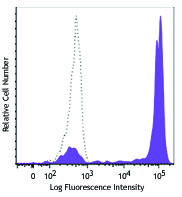
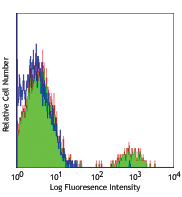
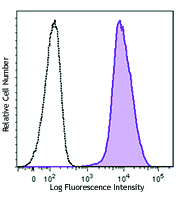
Compare Data Across All Formats
This data display is provided for general comparisons between formats.
Your actual data may vary due to variations in samples, target cells, instruments and their settings, staining conditions, and other factors.
If you need assistance with selecting the best format contact our expert technical support team.
-
FITC anti-human CD51/61
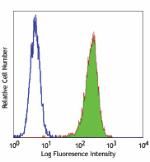
Human melanoma cell line M21 stained with 23C6 FITC -
PE anti-human CD51/61
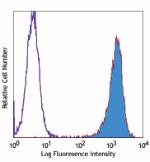
Human melanoma cell line M21 stained with 23C6 PE -
Purified anti-human CD51/61
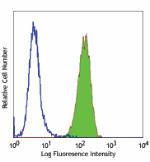
Human melanoma cell line M21 stained with purified 23C6, fol... 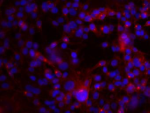
MDA-MB231 breast cancer cell line was stained with anti-huma... -
Alexa Fluor® 488 anti-human CD51/61
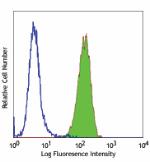
Human melanoma cell line M21 stained with 23C6 Alexa Fluor&r... -
Alexa Fluor® 647 anti-human CD51/61
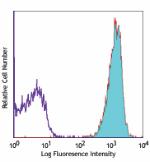
Human melanoma cell line M21 stained with 23C6 Alexa Fluor&r... -
Biotin anti-human CD51/61
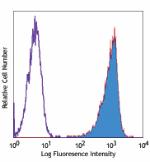
Human melanoma cell line M21 stained with biotinylated 23C6,... -
APC anti-human CD51/61
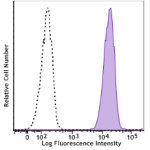
Human melanoma cell line M21 stained with CD51/61 (clone 23C... -
Ultra-LEAF™ Purified anti-human CD51/61

 Login / Register
Login / Register 









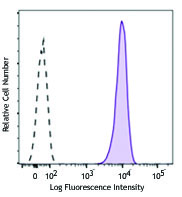







Follow Us